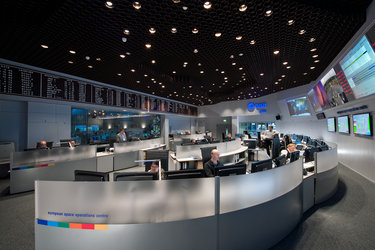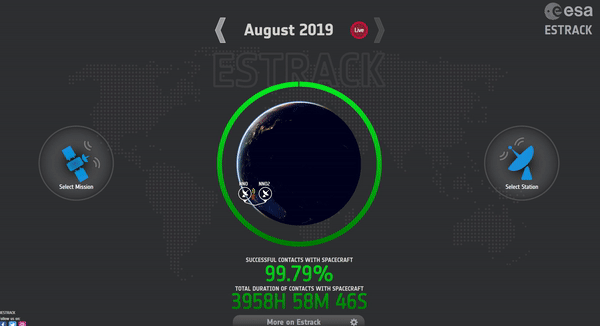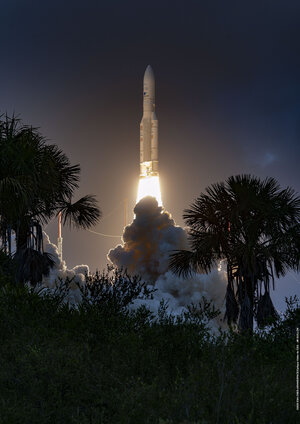Where missions come alive
Step inside ESA's Main Control Room at the Operations Centre in Darmstadt, Germany
Photo credit: ESA/J. Mai
ESA mission control, the European Space Operations Centre
As Europe's centre of excellence for satellite operation, ESA's mission control is home to the engineering teams that control spacecraft in orbit, manage our global tracking station network, and design and build the systems on the ground that support missions in space. It is also now home to the Agency's growing Space Safety programme. Since 1967, more than 85 satellites belonging to ESA and its partners have been successfully flown from Darmstadt, Germany.

Here at 'ESOC', teams are trusted to fly the missions that no one else in Europe can: the ‘first-of-their-kind’, experimental flights that explore our planet provide critical data on climate and the environment, or take Europe beyond Earth – toward the Sun, to the Moon, to Mars and far into the Solar System.
The independent capability to fly Europe’s missions for planetary science, Earth observation, astronomy, fundamental physics, exploration and space safety is crucial to our autonomy as a space power.
Protecting Earth and assets in space
The Centre is home to ESA's Space Safety programme, focussed on the hazards in space that threaten everything modern society makes possible: space debris could make economically vital Earth orbits unusable and destroy satellites; approaching asteroids could impact our planet; and solar activity endangers satellites and astronauts as well as potentially damaging sensitive civil infrastructure, such as power grids on Earth.
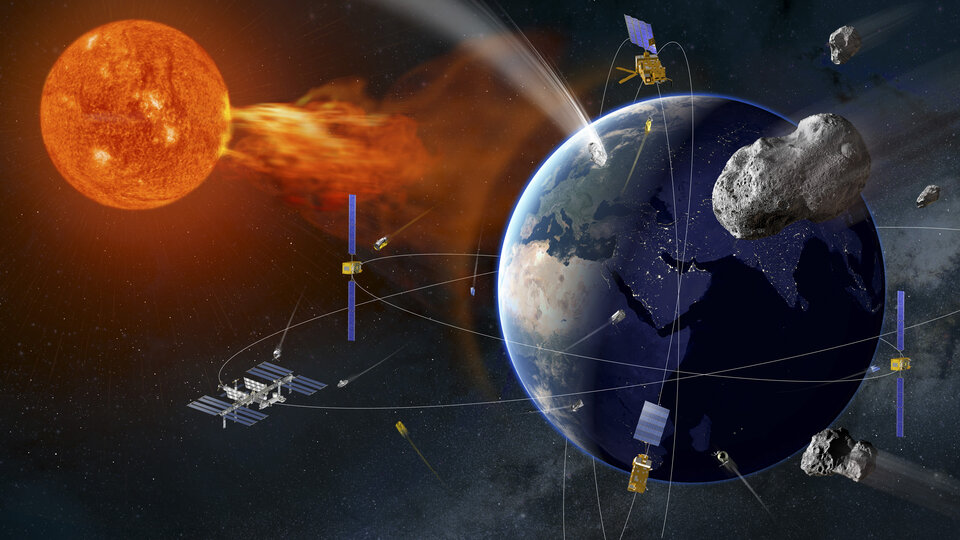
The programme is responding to these threats with new technologies and missions to provide near real-time data freely available, to decision makers and citizens, to protect Earth. An ambitious zero-debris policy means Europe is leading the way in sustainable utilisation of our space resources. This supports ESA’s PROTECT Accelerator, which aims to ensure resilient availability and functioning of space infrastructure.
Flying missions like no other
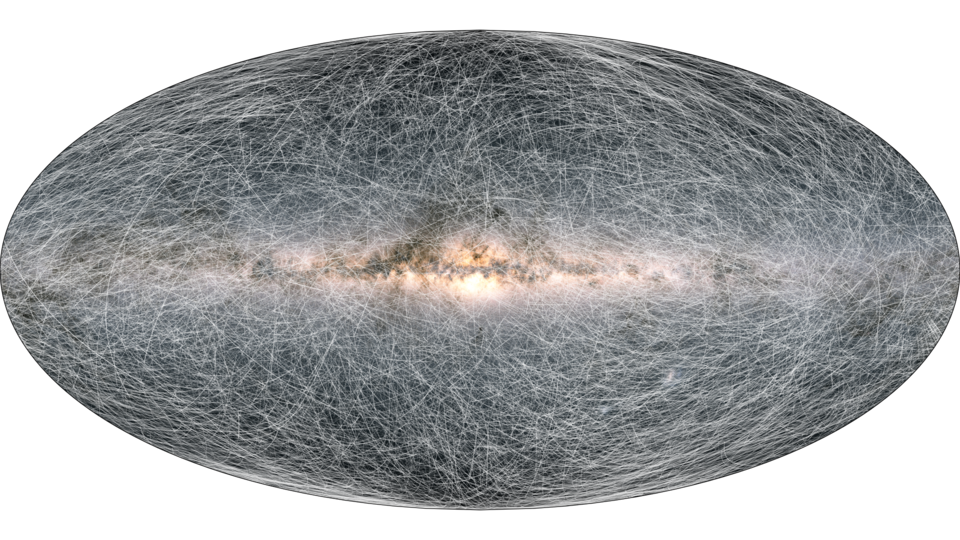
Following earlier missions such as Rosetta, Herschel, Planck and many others, teams at ESOC are today flying multiple ambitious missions including:
- Astronomy & fundamental physics: Gaia, Solar Orbiter, Cluster, Integral, XMM Newton
- Planetary exploration: Mars Express, ExoMars Trace Gas Orbiter, BepiColombo
- Copernicus and Earth sciences: Sentinels, CryoSat, Aeolus, Swarm
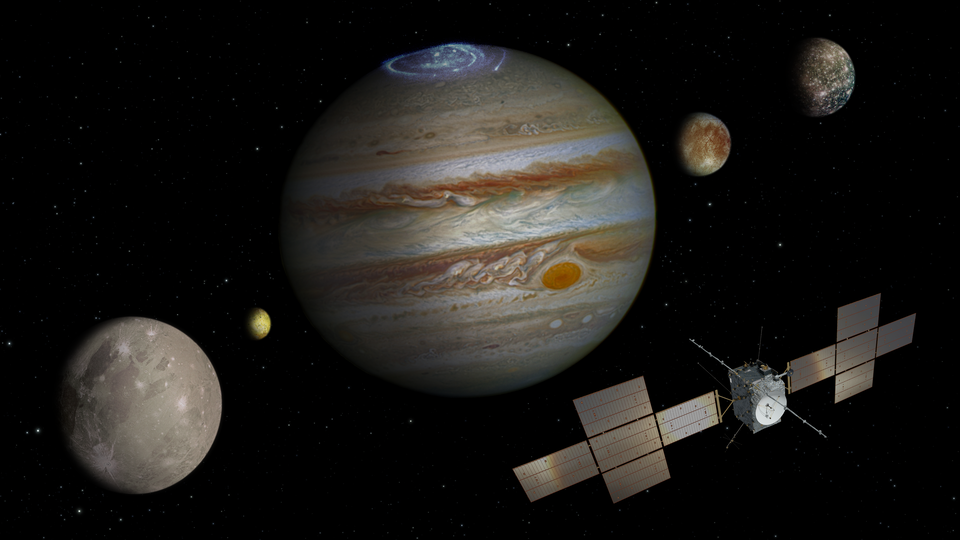
Currently more than 20 satellites are flown from ESOC, with a dozen new missions now in development for future launch, including JUICE, Europe’s first mission to Jupiter. ESOC has also supported missions for other organisations such as Eumetsat, Europe's meteorological satellite agency, as well as commercial missions.
Space on Earth
ESA’s expertise has ensured that ESOC, ‘mission control’, is recognised internationally as a centre of excellence for spaceflight operations, ground system engineering and satellite astrodynamics. Our teams control spacecraft in orbit, manage ESA’s global ground station network, Estrack, and develop mission control software and techniques.

Together these comprise the ‘Mission Operations Infrastructure’ that is a key strategic asset for ESA and its Member States – and is unique in Europe. We oversee the design and development of tailor-made systems on the ground that support missions in space, working with industry to provide innovative, multi-mission solutions for the future.
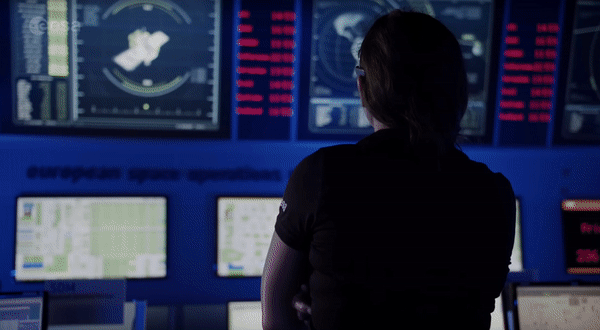
ESA’s role in developing new ground system infrastructure and deep-space communication capabilities is essential for European competitiveness and leadership. Our expertise in operations and international coordination ensures Europe’s lead in setting global standards for spaceflight.
The independent and secure capacity to operate the full range of ESA missions, present and future, underpins Europe’s autonomy as a space power. ESA’s space operations centre is a centre of excellence, a driver of innovation and an enabler of industry. Increased data downlink capacity, enhanced space-to-ground cybersecurity, highly performant and precise flight dynamics and mission analysis services and sophisticated monitoring, control and simulation capabilities all ensure Europe’s lead in spaceflight.





